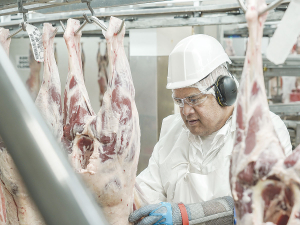Every vote will count - Alliance chair
An independent report, prepared for Alliance farmer shareholders is backing the proposed $250 million joint venture investment by Irish company Dawn Meats Group.
 A combination of increasing costs, falling sheep numbers and improved efficiency is behind Alliance’s move not operate a sixth chain at Lonreville this season.
A combination of increasing costs, falling sheep numbers and improved efficiency is behind Alliance’s move not operate a sixth chain at Lonreville this season.
Southern meat processor Alliance Group will not be starting its sixth sheepmeat processing chain at its Lorneville meat works in Southland this season.
The company has blamed a combination of increasing costs, falling sheep numbers and improved efficiency throughout its network for the move. Management at the Invercargill-based plant believes throughput will be maintained, with workers redeployed to minimise any job losses.
Lorneville normally has six chains working by Christmas, but chief executive Willie Wiese says the decision not to start the sixth this year only applies to this season.
"We looked at the five-year average, the current livestock census and the forecast farmer supply as it has played out, and we can accommodate that volume across our network," he explains.
He denies that the decision is in response to Alliance's $97.9 million loss before tax recorded late last year. Wiese claims that loss was due to revalued inventory, soft markets and the cost from early recruitment of staff early ahead of an anticipated dry summer that never eventuated.
He adds that Alliance is focusing on becoming New Zealand's most efficient meat processing company.
"We are making sure that as we build to become the country's most efficient meat processor, we can also look at what our capacity needs are."
He says the company has increasingly relied on overseas staff to staff the chain, but that came with the added cost of finding accommodation.
Alliance's processing and safety manager Wayne Shaw says there will be no issues for farmers wanting to get stock killed.
"We do not believe the proposed reconfiguration (dropping the chain at Lorneville) will have a material impact on the ability of farmers to get their livestock processed."
He says Alliance keep an eye on the situation - especially during extreme dry conditions.
Shaw concedes that there will be fewer full-time employees at Lorneville, but says it was too early to confirm how many workers will be directly impacted. It is believed that closing the chain at Lorneville will reduce Alliance's reliance on overseas labour, which has peaked at around 200 people in recent sessions.
An independent report, prepared for Alliance farmer shareholders is backing the proposed $250 million joint venture investment by Irish company Dawn Meats Group.
Whangarei field service technician, Bryce Dickson has cemented his place in John Deere’s history, becoming the first ever person to win an award for the third time at the annual Australian and New Zealand Technician of the Year Awards, announced at a gala dinner in Brisbane last night.
NZPork has appointed Auckland-based Paul Bucknell as its new chair.
The Government claims to have delivered on its election promise to protect productive farmland from emissions trading scheme (ETS) but red meat farmers aren’t happy.
Foot and Mouth Disease outbreaks could have a detrimental impact on any country's rural sector, as seen in the United Kingdom's 2000 outbreak that saw the compulsory slaughter of over six million animals.
The Ministry for the Environment is joining as a national award sponsor in the Ballance Farm Environment Awards (BFEA from next year).

OPINION: For years, the ironically named Dr Mike Joy has used his position at Victoria University to wage an activist-style…
OPINION: A mate of yours truly has had an absolute gutsful of the activist group SAFE.